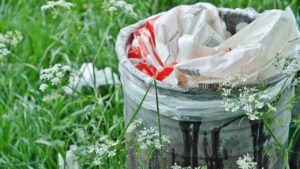How to Embrace a More Sustainable Lifestyle
By Emily Powell
So you’ve come to this website looking for some gardening advice, or maybe you’re seeking comfort in the arms of other like-minded urbanites who yearn to experience the satisfaction of growing and eating homegrown food. And maybe, just maybe, you don’t really know how this whole “sustainability” thing works, or where you need to start in order to lessen your environmental impact. That’s totally cool, there’s no need to hide it. We’re glad you’re here and we are thrilled to help.
First things first, I would like to emphasize that leading a minimally-impacting lifestyle that adheres to the principles of sustainability does not require you to go off the grid, live in a mud hut, gather wild berries for sustenance and condemn all forms of modern luxuries. In fact, leading a more sustainable lifestyle can be as quick and painless as choosing a different replacement lightbulb at the store, or turning off the water faucet while you brush your teeth. Because our way of life and the structure of our society have granted us the freedom to ignore/be ignorant towards the consequences of our carbon-consuming actions, being more sustainable simply means dedicating a few more seconds every day to decisions that can either defeat or feed climate change.
The goals of sustainable living are simple: Be happy, and use the least amount of resources needed to do so. We want to live in such a way that enables the maximum number of other people to pursue their own happy lifestyles AND to leave enough so the next generation can do the same. Living sustainably to contribute to these goals is NOT rocket science. To get you thinking and to get you started, here are some categories of sustainability goals that expand far beyond the traditional recycling-freak stereotype (and these just barely scratch the surface):
- Materials and technology sustainability
- Reducing the amount of waste that goes to landfills (recycling, buying less)
- Reducing the use of fossil fuel energy
- Helping to minimize the production of materials that are not recyclable
- Helping to minimize the permanent geological damage caused by mining raw materials
- Food sustainability
- Eating local (or better yet homegrown), nutritious food
- Supporting local economies through local food producers
- Eating less meat and other foods that require excessive inputs of resources
- Choosing foods without harmful chemicals or highly processed ingredients
- Water sustainability
- Using less water in the home (shorter, cooler showers; less water-consuming plants; low-flow faucets; etc.)
- Promoting proactive water policy in the community
“Being sustainable” happens when every decision of consumption is made with the principles of sustainability (environment, people, economy) in mind. It’s a lot to think about, I know. It seems hard because the structure of our lifestyles instructs us to do a certain thing, like buy a soda because there’s limited drinking water available in a building, then drink the soda which will spike blood glucose levels and probably leave us hungrier than before, then throw the soda can away because there isn’t a recycling can around and you have no more use for the can. Living a sustainable lifestyle might mean choosing not to buy that soda can.
This goes against the grain and against your immediate urges, and no, it won’t make that much of an immediate difference because that particular soda can is probably just going to be sold to someone else. But after all, that single decision to not buy the soda is a commitment to doing what it takes to choose sustainable options, like bringing a reusable bottle and refilling it at a water fountain. Every drop in the bucket is a drop closer to filling it up. So don’t get discouraged. Keep making good decisions and know that, by leading by example, you ARE making a difference.
Emily’s exuberant passion for sustainability and sustainable nutrition stems from her everlasting love for the outdoors, people, dirt, and broccoli. As an undergraduate in the School of Sustainability at Arizona State University, Emily is working towards becoming a spokesperson for everyday sustainable food and lifestyle choices, including decisions on what foods you buy, where you buy them, and how you make the most of foods’ energy. Leveraging communication through writing, Emily has been recognized in competitions such as the DuPont Challenge and the Apprentice Ecologist Initiative for her essays on sustainability issues and initiatives, including Honeybee Colony Collapse Disorder and community gardens in elementary schools. Emily aspires to utilize relationships with other academic disciplines to plant the seeds of sustainability and nutrition principles in the young adults of her generation. She plans to earn her Registered Dietitian credential and work either on the community or personalized sustainable nutrition level.
*Disclosure:
Some of the links in our podcast show notes and blog posts are affiliate links and if you go through them to make a purchase, we will earn a nominal commission at no cost to you. We offer links to items recommended by our podcast guests and guest writers as a service to our audience and these items are not selected because of the commission we receive from your purchases. We know the decision is yours, and whether you decide to buy something is completely up to you.








Very well said Emily! Your passion and clarity have re-inspired me.